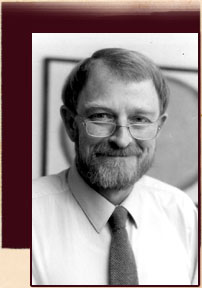| |
Robert Wallace
Robert Wallace was born in 1932 in Springfield, Missouri, the son of a furniture maker. By the age of ten, he was crafting poems influenced by the witty verse of Ogden Nash and Richard Armour. At 16, one of his poems was published in The Rotarian magazine. He graduated summa cum laude from Harvard in 1953, where he had formed a life-long friendship with fellow student John Updike. His own poems were then appearing in Christian Science Monitor and The Lyric. He traveled to England as a Fulbright scholar and Woodrow Wilson fellow, enrolling in St. Catharine’s College, Cambridge, where he earned a second Bachelor of Arts degree in English, with honors. After a two year stint in the army, his first book appeared, This Various World and Other Poems (Scribner’s 1957).
Wallace’s teaching career began at Bryn Mawr College in 1957, and continued at Sweet Briar and Vassar Colleges before he joined the faculty of CWRU in 1965. His second book, Views from a Ferris Wheel (E.P. Dutton), appeared that same year, followed by Ungainly Thing (1968) for which he received the Cleveland Arts Prize. Swimmer in the Rain (Carnegie Mellon Univ. Press 1979) was followed by Girlfriends and Wives (Carnegie Mellon 1984), and The Common Summer: New and Selected Poems (1989).
While teaching and writing, he launched Bits Press in 1974. Devoted to the short poem, Bits began by publishing a magazine, Bits, from 1975 to 1980, but quickly branched out to publish chapbooks by single authors as various as Updike, Mary Oliver, and X.J. Kennedy. Frequently assisted by students, Wallace hand-set and printed both Bits and the chapbooks on a Chandler & Price printing press at his Cleveland Heights home. In 1985, Bits Press debuted a series of hard-bound collections of new light verse and funny poems by both famous and unknown authors called Light Year, which was published, first annually, then biennially, until 1989.
Robert Wallace died in April 1999 at the age of 67, while working on his much used text, Writing Poems (HarperCollins).
The Cleveland Arts Prize (Robert Wallace)
The Robert Wallace Collection at Missouri State University Libraries
The Double Play
by Robert Wallace
In his sea-lit
distance, the pitcher winding
like a clock about to chime comes down with
the ball, hit
sharply, under the artificial
bank of lights, bounds like a vanishing string
over the green
to the shortstop magically
scoops to his right whirling above his invisible
shadows
in the dust redirects
its flight to the running poised second baseman
pirouettes
leaping, above the slide, to throw
from mid-air, across the colored tightened interval,
to the leaning-
out first baseman ends the dance
drawing it disappearing into his long brown glove
stretches. What
is too swift for deception
is final, lost, among the loosened figures
jogging off the field
(the pitcher walks), casual
in the space where the poem has happened.
Giacometti's Dog
by Robert Wallace
Lopes in bronze:
scruffy,
thin. In
the Museum of Modern Art
head
down, neck long as sadness
lowering to hanging ears
--he's eyeless--
that hear
nothing, and the sausage
muzzle
that leads him as
surely as eyes:
he might
be
dead, dried webs or clots of flesh
and fur
on the thin, long bones--but
isn't, obviously
is obviously
traveling intent on his
own aims: legs
lofting
with a gayety the dead aren't known
for, Going
onward in one place,
he doesn't so much ignore
as not recognize
the well-
dressed Sunday hun-
dreds who passing, pausing make
his bronze
road
move. Why
do they come to admire
him?
They wouldn't care for real dogs
less raggy
than he
is? It's his tragic
insouciance
bugs them? or is
it that art can make us
cherish
anything--this command
of shaping and abutting space--
that makes us love
even mutts,
even the world, accep
even
the starry wheels by which we're hurled
toward death, having
the rocks and
wind for comrades?
It's not this starved hound,
but Giacometti seeing
him we see.
We'll stand in line all day
to see one man
love anything enough.
|
|
 |
|